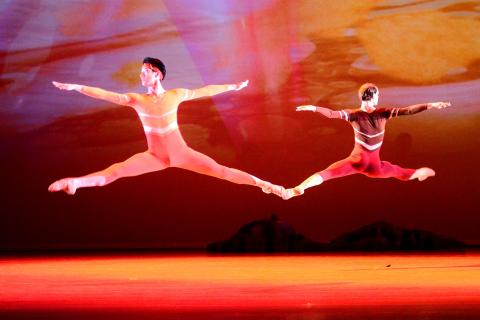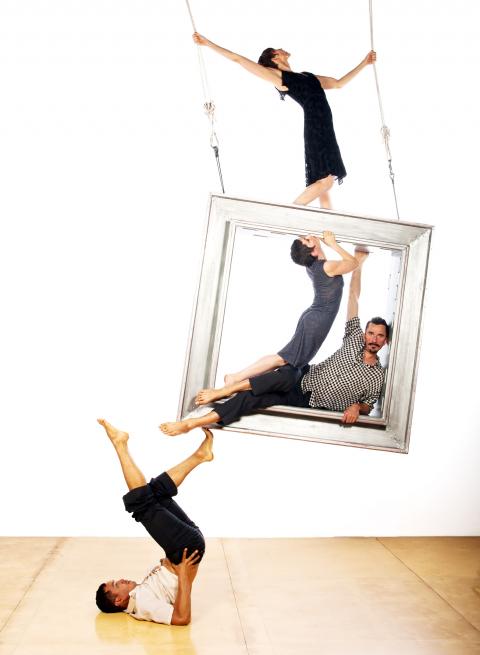For the past several years, ballet lovers in Taiwan have been able to tell the passage of time by the annual return of Tainan-born, Austria-based choreographer Allen Yu (余能盛) with a new production for the Chamber Ballet Taipei (台北室內芭蕾舞團).
You knew summer was waning when Yu’s handpicked dancers took the stage, yet, this year August came and went without a new show.
It turns out that it has been a year of many changes for Yu and the company.

Photo courtesy of Formosa Ballet
Earlier this year, the Tainan Municipal Cultural Center marked its 31st anniversary by making Yu its first artistic director. Yu has given up his posts as deputy ballet director and choreographer at the Graz Opera House in Austria so that he could devote more time to projects in Tainan, where his parents still live, although he will continue to be based in Graz.
With one eye on the future and possible international tours, Yu also changed the name of the company to Formosa Ballet (福爾摩沙芭蕾舞團) to better reflect the troupe’s origin.
If that was not enough, he decided against choreographing his latest production to Western classical music, going with traditional Chinese music instead.

Photo courtesy of Matt Haber
The new work, Pirouette—When Ballet Meets Chinese Music (天旋—當芭蕾遇到國樂) opened in Tainan last weekend and moves to Kaohsiung this weekend for a Sunday performance at the Kaohsiung Cultural Center’s Chihteh Hall.
Yu choose works by three well-known composers, Ma Shui-long’s (馬水龍) Bamboo Flute Concerto (梆笛協奏曲), Liu Chang-yuan’s (劉長遠) Variation of Emotions (抒情變奏曲) and Lu Liang-hui’s (盧亮輝) The Four Seasons (四季).
Yu said he wanted to show that classical ballet and classical Chinese music can work together.
“The three composers, one is from China, one from Hong Kong and one from Taiwan; one is classical, one neo-classical and one modern, while the techniques are also a mix of classical, neo-classical and modern ballet,” he said in a telephone interview last week.
Bamboo Flute Concerto was first written for Western orchestra, but later adapted to Chinese instruments.
“I imagined dancers as bamboo, the staging is quite big, with lots of bamboo trees,” Yu said.
As for Variation of Emotions, the second of three movements changes tempo quickly, making it difficult for the musicians and dancers.
Yu said that he invited The Four Seasons composer to watch the company’s rehearsals in Taipei, and Lu had been quite excited.
“For spring, there are a lot of flowers, the tutus are very colorful. Summer is very hot, a couple looks for water. In the autumn, the leaves are fading, the boyfriend/husband has to go away, leaving the woman alone at home… Usually in the West the music for winter is very quiet, but in Chinese [music] it is louder, very strong, because of the Lunar New Year celebrations. I think the music is very happy,” Yu said.
The 25-member cast rehearsed in Taipei for five weeks in July and August, taking a break while Yu went back to Austria. When he returned, they had two more weeks to pull the show together before the premiere.
As usual with Yu’s annual shows, his dancers have the luxury — for Taiwan — of performing with musicians, this time with the Tainan City Traditional Orchestra (臺南市立民族管弦樂團) under conductor Liu Wen-hsiang (劉文祥). However, this is another headache for Yu, since not all of the six theaters in the five-city tour have orchestra pits, which means he has to find room for the musicians on stage.
From Kaohsiung, the company will move on to Taichung, Hsinchu, New Taipei and then head back to Tainan for one final show.
While focused on the current tour, Yu has big plans for Formosa Ballet and for Tainan. He is already planning three productions for next year, in April, June and October, plus more artistic exchanges with Graz.
BANDALOOP
Meanwhile, today and tomorrow, the Oakland, California-based troupe Bandaloop will be bouncing off walls at Kaohsiung’s Da-Dong Performing Arts Center as part of the CTBC Arts Festival (新舞臺藝術節).
The 24-year-old company, founded by Amelia Rudolph, is a pioneer in “vertical dance,” which combines choreography and climbing, using the sides of buildings, cliffs, cargo containers or other structures as its “dance floor.”
The troupe is giving two performances of Harboring (婆娑之港) today and one tomorrow. Kaohsiung is the right place to show this work, which premiered in July 2013.
“Harboring was made to celebrate the transitional place between the ocean and the land. It’s about maritime cultural imagery and textures and the feeling of being on the ocean,” Rudolph says in a company video clip.
However, Harboring is more intimate than many of Bandaloop’s works, in that it was designed to bring the dancers closer to their audiences rather than soaring several stories above them.
IN THE CAPITAL CITY
For Taipei dance fans, there are two options this holiday weekend. At the Taipei National University of the Arts (國立臺北藝術大學) in Kuandu, the second dance offering of this year’s Kuandu Arts Festival is The Male Perspective, also known as Tango Verse, California State University-Fullerton professor Alvin Rangel’s exploration of the history of male tango dancers.
Tango Verse consists of Alejandro Cervera’s Parallel Tango and Rangel’s own Bound Tango, performed by Rangel and Ricardo Garcia.
There are three shows — tonight and tomorrow at 7:30pm and Sunday at 2:30pm — in the university’s Experimental Theater, with tickets priced at NT$500 and available through www.artsticket.com.tw, conv enience store kiosks or at the door.
At the Experimental Theater in the National Theater complex, the Creative Dance Theater (賴翠霜舞創劇場) will perform four shows of a new work by Lai Tsui-shuang (賴翠霜) and German dancer/choreographer Michael Hess, Blackout (記憶出軌), which explores aging and the brain’s short circuits as we search for memories that are gradually being deleted. The four-year-old company, founded by Germany-based Lai, has developed a reputation for thought-provoking works that pack an emotional punch.
Tickets are NT$600, available at the National Theater Concert Hall box offices, www.artsticket.com.tw and convenience store kiosks.
Performance Notes
WHAT: Pirouette—When Ballet Meets Chinese Music
WHEN: Sunday at 3pm
WHERE: Kaohsiung Cultural Center’s Chihteh Hall (高雄市文化中心至德堂), 67 Wufu 1st Rd, Kaohsiung City (高雄市五福一路67號)
ADMISSION: NT$400 to NT$1,500; tickets available online at www.artsticket.com.tw, convenience store ticketing kiosks and at the door
ADDITIONAL PERFORMANCES: Oct. 23 at 7:30pm at Taichung Chungshan Hall (台中中山堂), 98 Hsuehshi Rd, Taichung City (台中市學士路98號); Oct. 25 at 3pm at Performing Arts Center of the Cultural Affairs Bureau of Hsinchu County (新竹縣文化中心演藝廳), 146 Siancheng 9th Rd, Jhubei City, Hsinchu County (新竹縣竹北市縣政九路146號); Oct. 31 at 7:30pm and Nov. 1 at 3pm at New Taipei City Arts Center (新北市藝文中心演藝廳), 62 Jhuangjing Rd, Banciao District, New Taipei City (新北市板橋區莊敬路62號); and Nov. 7 at 7:30pm at Tainan Sinying Cultural Center (臺南市立新營文化中心), 23 Chungcheng Rd, Sinying District, Tainan City (台南市新營區中正路23號). Tickets are NT$400 to NT$1,500 for Taichung and Hsinchu, NT$400 to NT$2,000 for New Taipei City and N$400 to NT$1,000 for Tainan; available as above.
WHAT: Harboring
WHEN: Today at 2pm and 7:30pm, tomorrow at 2:30pm
WHERE: Dadong Arts Center (大東文化藝術中心), 161 Guangyuan Rd, Kaohsiung City (高雄市光遠路161號)
ADMISSION: Only tickets left are NT$1,700 to NT$3,000; available through www.artsticket.com.tw, convenience store ticketing kiosks and at the door.

Towering high above Taiwan’s capital city at 508 meters, Taipei 101 dominates the skyline. The earthquake-proof skyscraper of steel and glass has captured the imagination of professional rock climber Alex Honnold for more than a decade. Tomorrow morning, he will climb it in his signature free solo style — without ropes or protective equipment. And Netflix will broadcast it — live. The event’s announcement has drawn both excitement and trepidation, as well as some concerns over the ethical implications of attempting such a high-risk endeavor on live broadcast. Many have questioned Honnold’s desire to continues his free-solo climbs now that he’s a

As Taiwan’s second most populous city, Taichung looms large in the electoral map. Taiwanese political commentators describe it — along with neighboring Changhua County — as Taiwan’s “swing states” (搖擺州), which is a curious direct borrowing from American election terminology. In the early post-Martial Law era, Taichung was referred to as a “desert of democracy” because while the Democratic Progressive Party (DPP) was winning elections in the north and south, Taichung remained staunchly loyal to the Chinese Nationalist Party (KMT). That changed over time, but in both Changhua and Taichung, the DPP still suffers from a “one-term curse,” with the

Jan. 26 to Feb. 1 Nearly 90 years after it was last recorded, the Basay language was taught in a classroom for the first time in September last year. Over the following three months, students learned its sounds along with the customs and folktales of the Ketagalan people, who once spoke it across northern Taiwan. Although each Ketagalan settlement had its own language, Basay functioned as a common trade language. By the late 19th century, it had largely fallen out of daily use as speakers shifted to Hoklo (commonly known as Taiwanese), surviving only in fragments remembered by the elderly. In

Lines between cop and criminal get murky in Joe Carnahan’s The Rip, a crime thriller set across one foggy Miami night, starring Matt Damon and Ben Affleck. Damon and Affleck, of course, are so closely associated with Boston — most recently they produced the 2024 heist movie The Instigators there — that a detour to South Florida puts them, a little awkwardly, in an entirely different movie landscape. This is Miami Vice territory or Elmore Leonard Land, not Southie or The Town. In The Rip, they play Miami narcotics officers who come upon a cartel stash house that Lt. Dane Dumars (Damon)